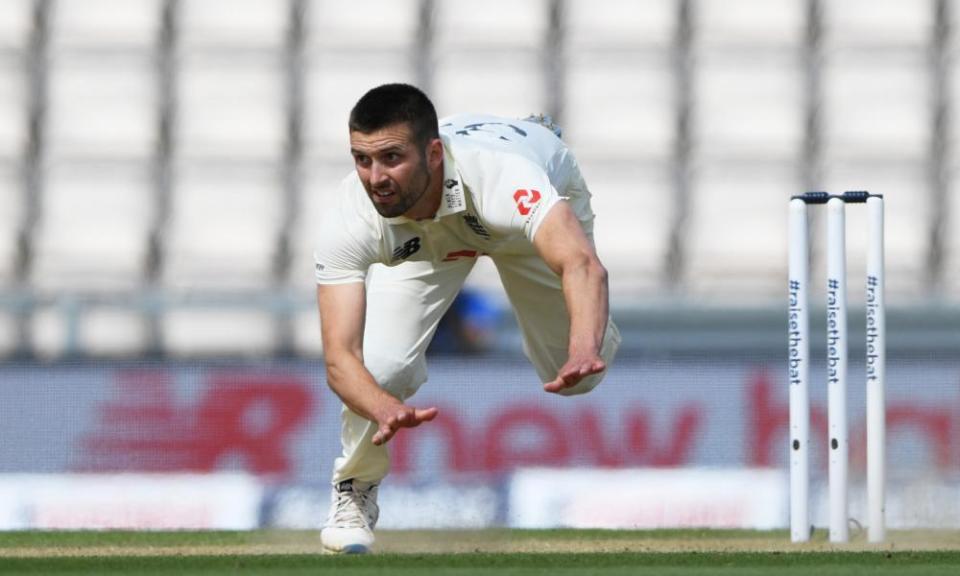Mark Wood's struggles prove that quickest does not always mean most effective

It wasn’t what Stuart Broad said, so much as the look on his face as he said it. In a live TV interview minutes before the start of play on Friday, Broad spoke with refreshing honesty about how it felt to be dropped, how he felt “angry and gutted” about being left out of this match. He had been England’s leading wicket-taker in their last series, after all, and had finished third in the overall list in Test cricket last year. “The chairman of selectors made it clear that they’re picking pitch for pitch,” he said, “so that means if I get to Old Trafford and it looks like it might seam from full of a length I might have a chance.”
His smile, which you might think looked remarkably like a smirk, suggested he was feeling just a bit sardonic. Forgive him for it, he spoke sincerely, too, about how well his teammates were bowling, pointed out that Chris Woakes and Sam Curran were feeling pretty aggrieved at being left out too. But the implication was clear: he was sure the selectors had got the decision horribly wrong.
Related: Roston Chase defies England to put West Indies in driving seat
Minutes later, Mark Wood, one of the men they had picked ahead of Broad, kicked into his run to start the first over of the day. Wood’s second ball was clocked at 93mph, faster than anyone else had bowled in the match yet. By the time his third over came around, he was really ticking. The first, second, and third balls were all just up above 90mph, the fourth 95.1mph and, according to the ball-tracking data, was apparently the fastest he had ever bowled, the sixth was almost as quick at 94mph. Taken altogether, all six balls well above that 90mph barrier, it must have been one of the quickest overs ever bowled by an Englishman in England.
That distant rumble you just heard from beyond the horizon is the sound of Fred Trueman drawing breath, ready to correct us, tell us, perhaps, about his spell in the second innings of his debut Test against India in 1952, when he had them nought for four. Harold Larwood and Frank Tyson would have their claims as well, though their most famous fast spells were bowled away in Australia, in 1932‑33 and 1954-55. Devon Malcolm would have been up in those reaches when he blew away South Africa at the Oval in 1994, and we know Jofra Archer was against Australia at Lord’s last year, when he delivered a string of 16 90mph deliveries in a row.
And that’s about it, a handful of contenders from across the best part of a century, the lesser-spotted quicks of English cricket. Right now, England have luxury of being able to pick two of them in the very same XI, which makes this just about the fastest attack they’ve ever fielded. Only, just because they can, doesn’t necessarily mean they should. There’s a reason English fast bowlers have been so few far between. And it’s because they often have to play in conditions like these. There are other ways to get ahead as a bowler in English conditions. Quickest isn’t necessarily always most effective.
Which brings us right back to that smile Broad was sporting on Friday morning.
He was right. Quick as Wood bowled, he didn’t cut through. There were moments, it’s true, when he had the batsmen in trouble, the odd edge that flew past the slips, or looped into the outfield, a pull that screwballed away over short leg. But as the morning wore on and Kraigg Brathwaite and Shai Hope settled into their work, the idea of trying to beat up West Indies with fast bowling in English conditions gradually began to seem like a pretty Baldrickian bit of cunning. That’s easy to write in hindsight, of course, but Broad, for one, would probably tell you he knew it all along. And in the end it was Dom Bess, of all people, who got the breakthrough England needed.
Bess ended up bowling 19 overs in the first two sessions, a quantity of off-spin that tells you in itself England had got the balance of their attack wrong.
Related: Stuart Broad 'frustrated, angry and gutted' at being left out by England
If that didn’t get the message across, there was the contrast with the way West Indies had bowled over the first two days, (when, it’s true, the overcast weather meant they had much the better conditions for bowling), when Jason Holder had carved England apart with his wobbly medium pace, bowling like any number of canny old English pros you might know from the county circuit. It was as if two teams had swapped roles, and this was a body-swap plot. Freaky Friday at the Test.
Wood and Archer will win Tests yet – in Australia, England hope, during the Ashes at the back end of next year. They may even do it at Old Trafford next week, since it’s one of the quicker pitches around. If they get the opportunity, that is. You’d wager the selectors might think twice before they leave Broad out again.

 Yahoo Sport
Yahoo Sport 





































